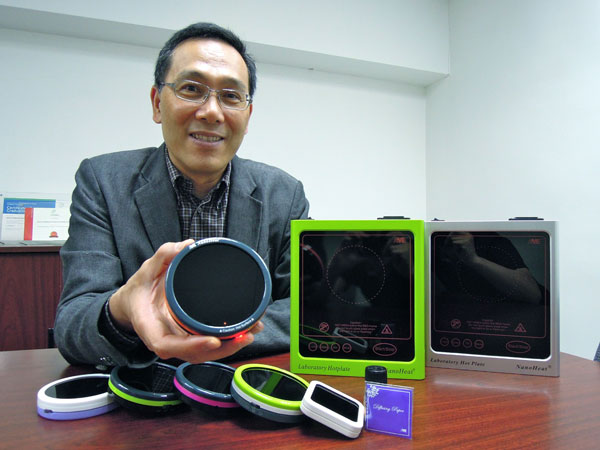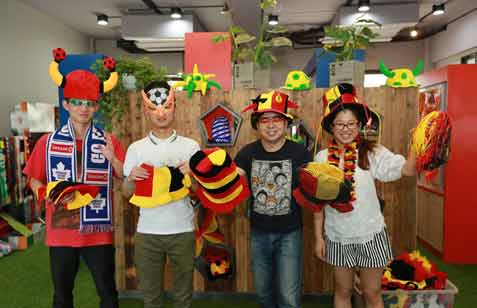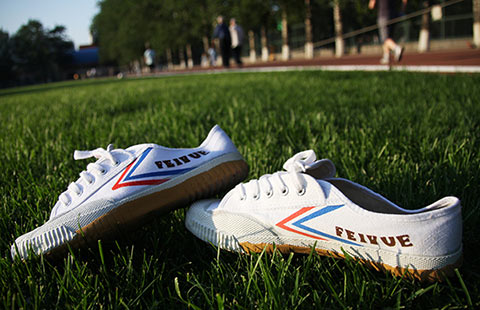HK inventor's NanoHeat wins global applications
(chinadaily.com.cn) Updated: 2012-11-20 16:04Few technology companies that were incubated in Hong Kong have shown as much potential, then what has been demonstrated by the success of Advanced Materials Enterprises Co Ltd (AME). Founded by Dr. Wing-Yiu Yeung in December 2006, in less than four years this start-up was winning industry awards and attracting investment interests from international brands, seeking to collaborate and develop applications for AME inventions. Yeung, who is considered one of Hong Kong's most outstanding inventors, and AME have successfully filed more than 50 applications for patents and design (exterior) registrations, including a US utility model patent for the company's marquee technology "NanoHeat ". Due to its energy efficiency and high performance characteristics, NanoHeat has the potential for a wide range of applications and is a first-rate demonstration to show that Hong Kong can create advanced technology for the rest of the world.
 |
Yeung, who is AME's chief executive officer, received his doctorate degree in Materials Science from the University of Hong Kong. He served as a teaching and research fellow at a university in Australia where he worked as an engineer. It was in this period when he learned the significance of IP rights protections. In 2006, Yeung returned to Hong Kong and started his research and developments (R&D) work on advanced technology products. "We were determined to become a Hong Kong-based, world-class, advanced technology company, focused on high-end technology such as the commercial application of NanoHeat and protecting intellectual property rights for those inventions," Yeung said.
With NanoHeat technology, one can produce highly efficient, energy saving heating and warming capabilities that are applicable in many household products. Since NanoHeat does not create a magnetic field, which can cause interference with some devices, it is safe for use in medical apparatuses and fitness equipment. Another positive characteristic of NanoHeat technology is that the material is very thin, allowing greater flexibility in the design of products. The material has excellent penetrability and conductivity, so a device can be heated at a rate of five degrees Celsius a second or to a temperature of 300 degrees Celsius in one minute.
AME was set up to commercialize NanoHeat, Yeung said. The company has applied for 35 patents for NanoHeat technology, of which 25 have already been granted, including the most important, the U.S. patent. The company has successfully registered 28 design related patents, in all spending several million dollars on securing IP rights protections. "The aim is to create a stable, robust platform, then with this firm foundation we will have set up conditions to market the rights of our intellectual property to others," said Yeung.
The company has begun working with some major enterprises, to merge the technology with theirs. One of those is Interbrand, where AME is working on ‘aftermarket' issues. The results of AME's R&D will get sold to Interbrand. He pointed out this kind of cooperation helps the company to understand consumer products and mine the potential of NanoHeat. "We required that InterBrand sign a collaboration agreement and that NanoHeat technology is mentioned on labeling the product," Yeung said. "We requested Interbrand pay all R&D expenses." AME has developed several hotplate and heating platforms for medical and other professional laboratory uses and will focus on household applications. "NanoHeat has been favorably received in Europe by several international manufacturers of domestic electrical appliances, and we have a test plate and planning to bring out similar products next year," Yeung added.
In 2009, the company brought out its first line of original products, including the hotplate for use in the laboratory. "This hotplate can be heated to 300 degrees Celsius in just one minute and there is no magnetic interference, it is suitable for use in a laboratory or in medical fields, since you don't need to worry that its magnetic field will interfere with other hospital instruments and equipment," Yeung said. "Any kind of vessel or container can be used, including glass," he added. Another advantage of the NanoHeat hotplate is safety. "Students can do their experiments, such as temperature adjustments of enzymes, in a safe laboratory environment," he said, adding that one "international school in Hong Kong bought 40 of these because they believe they are superior to the Bunsen burner, which has been used for decades."
Other products developed by the company include an electronic NanoHeat milk warmer, an energy-efficient NanoHeat food hotplate and a portable/hand warmer. The company has sold 5,000 units of portable warmers in Hong Kong in a short time. AME is marketing its aroma diffuser and has received orders for its product from Italy. The next step will be to apply for IP rights.
Hong Kong has a good legal foundation, and applying for a patent is quick and convenient, Yeung said. In the early stages of setting up a company, one can find much talent and other resources, thus Hong Kong has all the criteria needed as an IP rights trading center. The Innovation and Technology Commission of the Hong Kong government encourages and supports small and medium-sized enterprises in their development work on innovations and technologies. Since the commission was established, the government has used the Small Enterprise Research Assistance Program (SERAP) to help many companies research and develop new technology. It could strengthen support as companies develop and open up to overseas markets, he said.
AME is considered a relative newcomer and to increase the company's profile, it participates in many competitions annually. It was listed among the top 12 finalists in the Asian Innovation Awards 2010 held by the Asian Wall Street Journal and this attracted much media attention. The company has won an award every year for the last four years. Another big step forward for the company was securing the U.S. patent for NanoHeat technology, a step, which boosted the company's value and industry awareness of its potential. AME would likely concentrate on the development of environmentally friendly heating systems, because global warming is growing more serious and energy systems which address this issue will be the trend for the future, Yeung said.
- China continues to contribute largest share of tourists to Asia Pacific: MasterCard
- Northeast SOEs to bear brunt of China's ownership reforms
- PPP fund worth $27b to start operation soon
- Chinese factories score a goal with Euro 2016
- Shanghai to become Tesla's production base for China: Media
- Volkswagen to produce more electric cars in China
- China green-lights two highway projects
- IngDan helps pioneers crowdfund and sell products


















